We may not have the course you’re looking for. If you enquire or give us a call on +48 221041849 and speak to our training experts, we may still be able to help with your training requirements.
We ensure quality, budget-alignment, and timely delivery by our expert instructors.
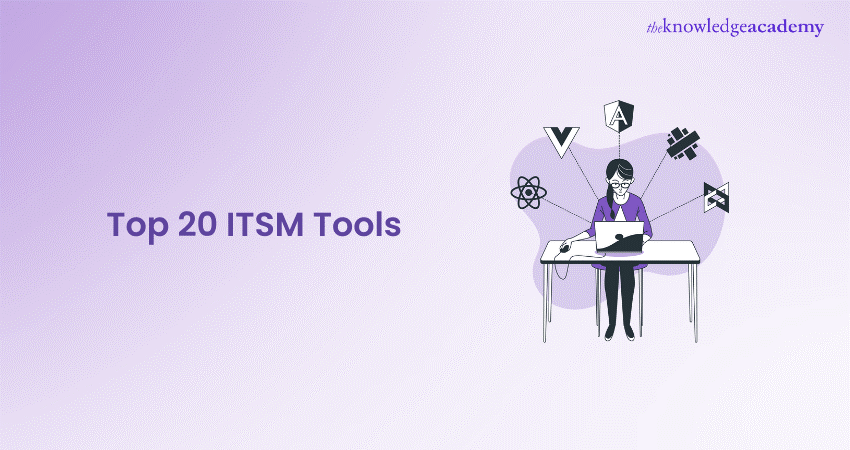
Picture this: your IT department is a well-oiled machine, humming along without a hitch. That’s the power of ITSM Tools. These tools aren’t just about keeping the lights on; they’re about transforming your IT operations into a powerhouse of efficiency and innovation. With ITSM Tools, every ticket is tracked, every issue is resolved swiftly, and every team member knows exactly what to do next. It’s like having a roadmap for IT success, right at your fingertips.
But let’s get real—ITSM Tools are more than just software. They’re the secret sauce that turns chaos into order, that empowers your IT team to be heroes in the eyes of your business. They help you anticipate problems before they become crises, streamline workflows, and deliver top-notch service every single time. In a world where technology is the backbone of business, ITSM Tools are your competitive edge, ensuring that your IT operations are not just functional, but exceptional.
Table of Contents
1) Understanding ITSM Tools
2) The Importance of IT Service Management Tools
3) Essential Features of IT Service Management Tools
4) Best IT Service Management Tools
5) Conclusion
Understanding ITSM Tools
IT Service Management (ITSM) refers to the implementation and management of IT services that align with the needs of an organisation. ITSM Tools are software solutions designed to streamline and optimise IT service delivery. These tools help manage IT processes, incidents, problems, changes, and service requests.
ITSM Tools play a vital role in managing IT services through structured processes and workflows. They offer capabilities such as incident management, problem management, Change Management, and service request management. By providing a centralised platform for handling IT services, ITSM Tools enhance operational efficiency and service quality.
The Importance of IT Service Management Tools
The importance of ITSM Tools lies in their ability to transform IT Service Management from a reactive to a proactive approach. Understanding the Benefits of IT Service Management further highlights how these tools contribute to streamlined processes, improved service delivery, and enhanced customer satisfaction. Here are key reasons why ITSM Tools are essential:
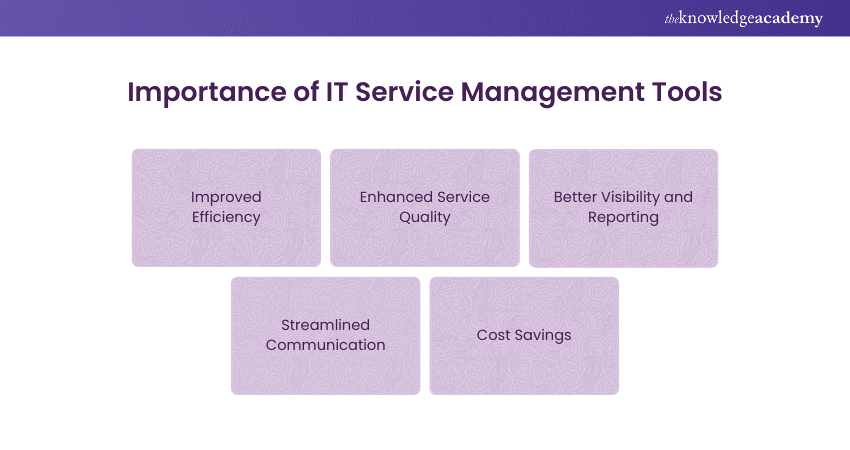
a) Improved Efficiency: ITSM Tools automate routine tasks, reducing manual effort and increasing operational efficiency. This automation allows IT teams to focus on more strategic tasks.
b) Enhanced Service Quality: With structured workflows and standardised processes, ITSM Tools help ensure consistent service delivery, improving overall service quality and customer satisfaction.
c) Better Visibility and Reporting: ITSM Tools provide real-time visibility into IT operations and performance through dashboards and reports. This transparency helps organisations make informed decisions and identify areas for improvement.
d) Streamlined Communication: These tools facilitate better communication between IT teams and end-users, enabling faster resolution of issues and more effective management of service requests.
e) Cost Savings: By automating procedures and improving efficiency, ITSM Tools help organisations reduce operational costs and optimise resource utilisation.
Essential Features of IT Service Management Tools
When evaluating ITSM Tools, it’s important to consider the following essential features:
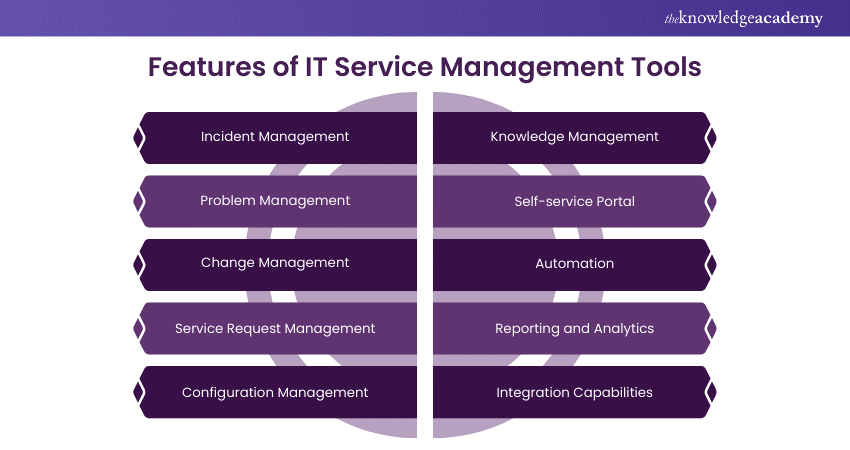
a) Incident Management: Tracks and manages incidents from detection through resolution, ensuring timely resolution and minimising impact on business operations.
b) Problem Management: Identifies the root cause of persisting issues and implements solutions to prevent future occurrences.
c) Change Management: Manages changes to the IT infrastructure in a controlled manner, minimising risks and ensuring minimal disruption to services.
d) Service Request Management: Handles and fulfils service requests from users, such as access requests or software installations.
e) Configuration Management: Maintains an up-to-date inventory of IT assets and their relationships, facilitating better management and tracking of configuration items.
f) Knowledge Management: Provides a repository of knowledge articles and solutions, enabling IT teams and users to find answers to common issues quickly.
g) Self-service Portal: Allows users to submit requests, track incidents, and access knowledge base articles through a user-friendly interface.
h) Automation: Automates routine tasks and workflows, improving efficiency and reducing manual effort.
i) Reporting and Analytics: Offers insights into IT operations and performance through customisable reports and dashboards.
j) Integration Capabilities: Integrates with other IT systems and tools, such as monitoring solutions and communication platforms, to streamline operations and enhance functionality.
Learn systematic problem-solving techniques with our Root Cause Analysis Training. Sign up now!
Best IT Service Management Tools
Here’s a detailed look at the top 20 ITSM Tools that stand out in the market:
1) SolarWinds Service Desk
SolarWinds Service Desk offers a comprehensive suite of ITSM functionalities designed to enhance IT Service Management. It excels in incident management, problem management, and Change Management. Key features include an intuitive self-service portal that allows users to submit and track tickets, a knowledge base for efficient problem resolution, and detailed reporting capabilities that provide insights into service performance.
The platform’s robust automation helps streamline processes and improve overall service efficiency, making it a popular choice for organisations seeking to optimise their IT operations.
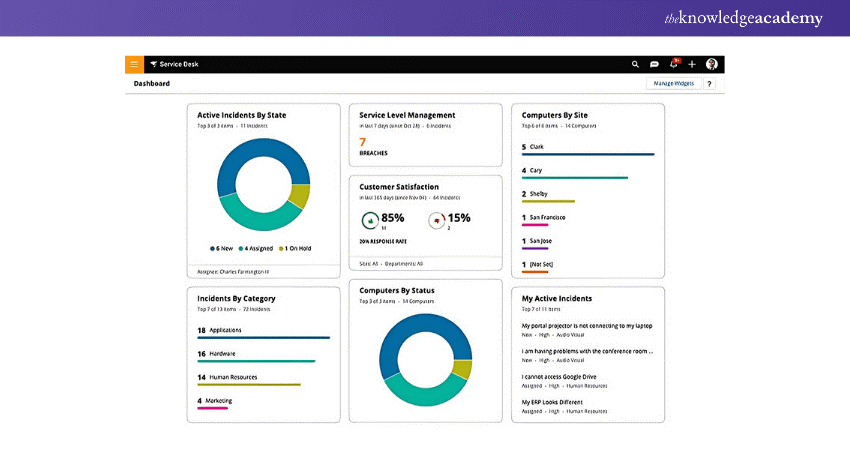
Pros:
a) Intuitive Self-Service Portal: Allows users to submit and track tickets easily.
b) Knowledge Base: Provides a repository of key information for quick problem resolution.
c) Detailed Reporting: Offers insights into service performance for better decision-making.
Cons:
a) Learning Curve: Some users find the initial setup and customisation complex.
b) Cost: Can be relatively expensive for smaller organisations.
2) Zluri
Zluri is a modern ITSM Tool that focuses on managing IT assets and applications with efficiency. It provides a centralised platform for tracking and managing software licenses, ensuring compliance, and optimising software usage. Key features include real-time visibility into software assets, integration with various applications for seamless management, and a user-friendly interface that simplifies asset tracking.
Zluri’s emphasis on compliance and optimisation makes it a valuable tool for organisations looking to boost their IT asset management strategies and maintain efficient software utilisation.
Pros:
a) Real-Time Asset Visibility: Provides up-to-date information on software assets.
b) Integration Capabilities: Connects seamlessly with various applications.
c) User-friendly Interface: Simplifies asset tracking and management.
Cons:
a) Limited ITSM Features: Focuses more on asset management rather than full ITSM functionalities.
b) Scalability Issues: May not be suitable for very large enterprises.
3) Jira Service Management
Jira Service Management by Atlassian is renowned for its flexibility and integration capabilities. It provides essential ITSM features such as incident management, problem tracking, and Change Management. Key features include seamless integration with other Atlassian products like Jira Software and Confluence, a user-friendly self-service portal for submitting and managing requests, and advanced automation capabilities that streamline workflows.
Its adaptability and robust integration options make it a preferred choice for organisations seeking to enhance collaboration and efficiency in their IT Service Management processes.
Pros:
a)Seamless Integration: Works well with other Atlassian products like Jira Software and Confluence.
b) Advanced Automation: Streamlines workflows and processes.
c) Customisable: Highly adaptable to various ITSM needs.
Cons:
a) Complex Interface: The UI can be overwhelming for new users.
b) Cost: Can become expensive as additional features and integrations are added.
Master Jira for seamless Project Management with our comprehensive Jira Training – join now!
4) Freshservice by Freshworks
Freshservice is a cloud-based ITSM Tool that simplifies IT Service Management through its user-friendly interface and powerful features. It includes incident management, problem management, Change Management, and a self-service portal.
Key features include automation capabilities that streamline routine tasks, integration options with various third-party applications, and an intuitive interface that enhances user experience. Freshservice’s cloud-based deployment and comprehensive feature set make it an ideal choice for IT teams looking to improve service delivery and operational efficiency.
Pros:
a) Automation Capabilities: Automates routine tasks and workflows.
b) Integration Options: Connects with various third-party applications.
c) Intuitive Interface: Easy for users to navigate and manage IT services.
Cons:
a) Limited Customisation: May not offer enough flexibility for some organisations.
b) Basic Reporting: Reporting features can be less advanced compared to competitors.
5) TOPdesk
TOPdesk provides a robust ITSM solution with a focus on user experience and flexibility. It offers features such as incident management, service request management, and Change Management.
Key features include an easy-to-navigate self-service portal, a knowledge base for quick problem resolution, and flexible configuration options that adapt to organisational needs. TOPdesk’s intuitive interface and comprehensive functionalities make it suitable for organisations of all sizes, helping them enhance their IT Service Management processes and improve user support.
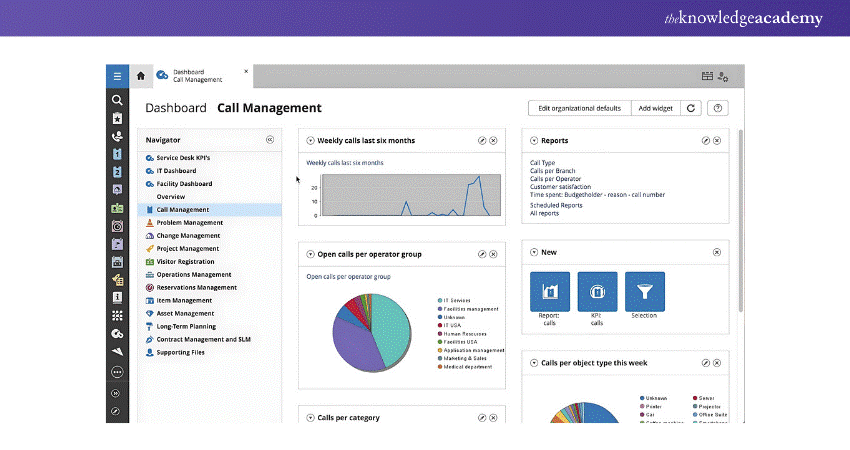
Pros:
a) User-friendly Portal: Simplifies the submission and tracking of service requests.
b) Knowledge Base: Supports efficient problem-solving through a comprehensive knowledge repository.
c) Flexible Configuration: Adaptable to various organisational needs.
Cons:
a) Learning Curve: May require training for full utilisation.
b) Integration Limitations: May not integrate as seamlessly with all third-party tools.
6) InvGate Service Desk
InvGate Service Desk offers a user-friendly ITSM solution with a focus on simplicity and efficiency. It includes essential features like incident management, problem management, and a self-service portal.
Key features include automation tools that help streamline IT service processes, a knowledge base for self-service support, and detailed reporting capabilities that provide insights into service performance. InvGate’s emphasis on ease of use and automation makes it a valuable tool for organisations looking to optimise their IT Service Management operations.
Pros:
a) Automation Tools: Enhances IT service processes through automation.
b) Knowledge Base: Provides self-service support to users.
c) Detailed Reporting: Offers insights into service performance.
Cons:
a) Limited Advanced Features: May lack some advanced functionalities found in larger platforms.
b) Integration Issues: Integration with some third-party tools can be challenging.
Elevate your IT Service Management career with the Certified Agile IT Service Manager (CAITSM) Course. Register today!
7) ServiceNow
ServiceNow is a leading ITSM Tool known for its extensive feature set and scalability. It provides functionalities such as incident management, problem management, Change Management, and configuration management..
Key features include advanced automation capabilities that streamline workflows, a comprehensive self-service portal for users, and integration options with various IT and business systems. ServiceNow’s robust capabilities and scalability make it a top choice for large enterprises seeking to enhance their IT Service Management and operational efficiency.
Pros:
a) Advanced Automation: Streamlines workflows with robust automation capabilities.
b) Comprehensive Integration: Connects with a wide range of IT and business systems.
c) Scalable: Suitable for large enterprises with complex needs.
Cons:
a) High Cost: Can be expensive for smaller organisations.
b) Complex Setup: Initial implementation and configuration can be time-consuming.
8) Spiceworks Cloud Help Desk
Spiceworks Cloud Help Desk offers a cost-effective ITSM solution with essential features like ticket management, asset management, and reporting. Key features include a user-friendly interface for managing support tickets, a cloud-based deployment that eliminates the need for on-premises infrastructure, and detailed reporting tools that provide insights into service performance.
Spiceworks Cloud Help Desk is well-suited for small to medium-sized businesses looking for a budget-friendly IT Service Management solution with core functionalities.
Pros:
a) Free Option Available: Provides a no-cost solution for basic ITSM needs.
b) User-friendly Interface: Easy for users to manage tickets and assets.
c) Cloud-Based Deployment: No need for on-premises infrastructure.
Cons:
a) Limited Advanced Features: Lacks some advanced functionalities found in paid solutions.
b) Scalability Issues: May not handle large-scale operations effectively.
9) BMC Helix ITSM
BMC Helix ITSM provides a comprehensive ITSM solution with a focus on AI-driven automation and cloud capabilities. It includes features such as incident management, problem management, Change Management, and a self-service portal.
Key features include AI-driven insights and automation that enhance service delivery, cloud-based deployment for scalability and flexibility, and a comprehensive knowledge base for efficient problem resolution. BMC Helix’s advanced features and scalability make it suitable for large organisations seeking to leverage AI and cloud technologies in their IT Service Management.
Pros:
a) AI-driven Automation: Enhances service delivery with advanced AI capabilities.
b) Cloud-based: Offers flexibility and scalability through cloud deployment.
c) Comprehensive Knowledge Base: Supports efficient problem resolution.
Cons:
a) High Cost: Pricing can be steep for smaller organisations.
b) Complex Setup: Initial configuration and customisation can be intricate.
10) GoTo Resolve
GoTo Resolve is a versatile ITSM Tool that offers features like remote support, incident management, and asset management. Key features include integrated remote support capabilities that facilitate troubleshooting, a user-friendly interface for managing incidents and assets, and seamless integration with other GoTo products for enhanced functionality.
GoTo Resolve’s combination of remote support and ITSM features makes it a valuable tool for IT teams seeking to streamline service delivery and improve support processes.
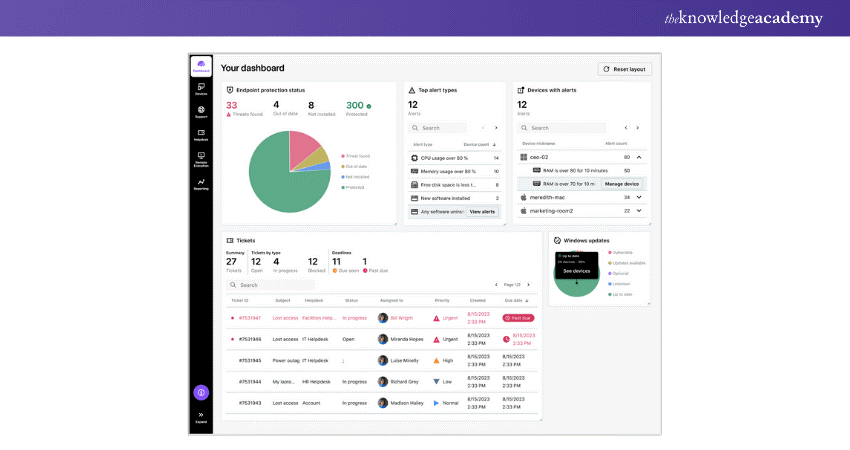
Pros:
a) Integrated Remote Support: Facilitates troubleshooting with remote access capabilities.
b) User-friendly Interface: Simplifies the management of tickets and assets.
c) Seamless Integration: Works well with other GoTo products.
Cons:
a) Limited ITSM Features: May lack some advanced ITSM functionalities.
b) Cost: Additional features may increase the overall cost.
11) ManageEngine
ManageEngine offers a range of ITSM solutions, including ServiceDesk Plus, which provides features such as incident management, problem management, and Change Management. Key features include a comprehensive ticketing system for managing incidents and requests, automation tools that streamline IT processes, and integration capabilities with various IT and business systems.
ManageEngine’s extensive suite of ITSM Tools and integration options make it a popular choice for organisations looking to enhance their IT Service Management and operational efficiency.
Pros:
a) Comprehensive Ticketing System: Manages incidents and requests effectively.
b) Automation Tools: Streamlines IT processes with automation.
c) Integration Capabilities: Connects with various IT and business systems.
Cons:
a) User Interface: Can be less intuitive compared to some competitors.
b) Complex Configuration: Customisation and setup can be challenging.
12) Zendesk Suite
Zendesk Suite is a customer service platform that includes ITSM functionalities such as ticket management, a self-service portal, and a knowledge base. Key features include an intuitive interface for managing support tickets, a self-service portal that allows users to find answers and submit requests.
It also includes integration with other Zendesk products for a seamless support experience. Zendesk Suite’s focus on customer service and ITSM makes it a helpful tool for organisations seeking to improve service delivery and support.
Pros:
a) Intuitive Interface: Simplifies ticket management and service delivery.
b) Self-Service Portal: Allows users to find answers and submit requests.
c) Integration with Zendesk Products: Enhances functionality through seamless integration.
Cons:
a) Basic ITSM Features: Focuses more on customer service rather than comprehensive ITSM.
b) Cost: Pricing can increase with added features and integrations.
Unlock the full potential of your IT operations with Agile IT Service Management Training. Sign up now!
13) SysAid
SysAid provides a complete ITSM solution with features such as incident management, problem management, and asset management. Key features include an easy-to-use interface for managing IT services, automation capabilities that streamline IT processes, and detailed reporting tools that offer insights into service performance.
SysAid’s flexibility and scalability make it suitable for organisations of all sizes, helping them optimise their IT Service Management and improve operational efficiency.
Pros:
a) User-friendly Interface: Facilitates the management of IT services and assets.
b) Automation Capabilities: Streamlines IT service processes.
c) Detailed Reporting: Offers insights into service performance.
Cons:
a) Scalability Issues: May not handle very large organisations as effectively.
b) Limited Advanced Features: Lacks some high-end functionalities of larger platforms.
14) Wolken Software
Wolken Software offers an ITSM solution with a focus on user experience and flexibility. It includes features such as incident management, problem management, and Change Management. Key features include an intuitive interface that enhances user experience, customisation options that tailor the tool to specific needs, and automation capabilities that streamline IT service processes.
Wolken’s emphasis on user experience and flexibility makes it a valuable tool for organisations seeking a tailored IT Service Management solution.
Pros:
a) Intuitive Interface: Enhances user experience with a user-friendly design.
b) Customisation Options: Allows tailoring of the tool to specific needs.
c) Automation Capabilities: Streamlines IT service processes effectively.
Cons:
a) Limited Integrations: Integration with some third-party tools can be challenging.
b) Cost: Pricing can be high for smaller organisations.
15) Cherwell
Cherwell provides a flexible ITSM solution with features like incident management, problem management, and Change Management. Key features include a user-friendly interface that simplifies service management, customisation options that allow organisations to adapt the tool to their needs, and integration capabilities with various IT and business systems.
Cherwell’s scalability and flexibility make it suitable for large enterprises seeking to enhance their IT Service Management processes.
Pros:
a) User-friendly Interface: Simplifies service management with an intuitive design.
b) Customisation Options: Allows for adaptation to specific organisational needs.
c) Integration Capabilities: Connects with various IT and business systems.
Cons:
a) Complexity: Can be complex to configure and customise.
b) Cost: Higher pricing may not be suitable for smaller enterprises.
16) NinjaOne
NinjaOne offers a comprehensive ITSM solution with features such as remote support, ticket management, and asset management. Key features include integrated remote support capabilities that facilitate troubleshooting, a user-friendly interface for managing tickets and assets, and automation tools that streamline IT service processes.
NinjaOne’s focus on remote support and comprehensive ITSM functionalities makes it a popular choice for IT teams looking to optimise their service management operations.
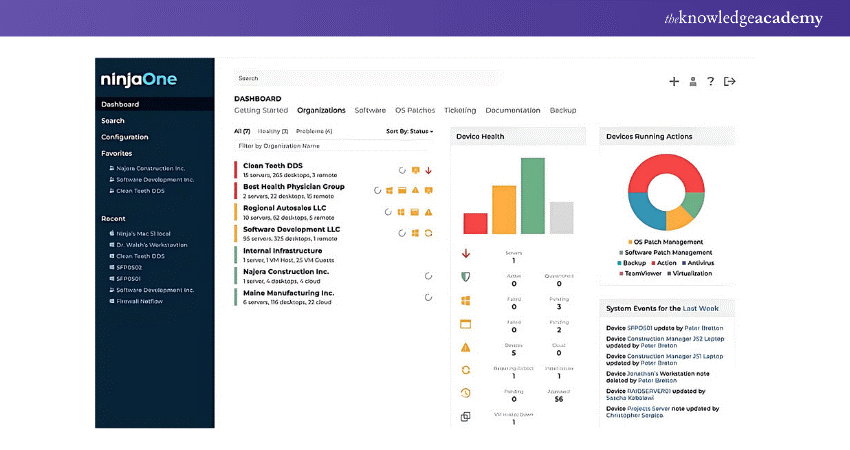
Pros:
a) Integrated Remote Support: Facilitates efficient troubleshooting.
b) User-friendly Interface: Simplifies ticket and asset management.
c) Automation Tools: Enhances IT service processes with automation.
Cons:
a) Limited ITSM Features: May not include some advanced ITSM functionalities.
b) Cost: Pricing can increase with additional features.
17) Zoho Assist
Zoho Assist provides remote support and ITSM functionalities such as incident management and asset management. Key features include cloud-based remote support tools that enable efficient troubleshooting, a user-friendly interface for managing incidents and assets, and integration with other Zoho products for enhanced functionality.
Pros:
a) Cloud-Based Remote Support: Enables efficient troubleshooting from anywhere.
b) User-friendly Interface: Simplifies incident and asset management.
c) Integration with Zoho Products: Enhances functionality through seamless integration.
Cons:
a) Limited ITSM Features: Focuses more on remote support than comprehensive ITSM.
b) Scalability Issues: May not handle large-scale operations effectively.
18) HubSpot
HubSpot, a Customer Relationship Management (CRM) platform includes ITSM functionalities such as ticket management and a knowledge base. Key features include an intuitive interface for managing support tickets, a self-service portal that allows users to find answers and submit requests, and integration with other HubSpot products for a seamless support experience.
HubSpot’s CRM focus combined with its ITSM capabilities makes it a useful tool for organisations looking to enhance customer support and service delivery, blending the strengths of CRM and ITSM functionalities.
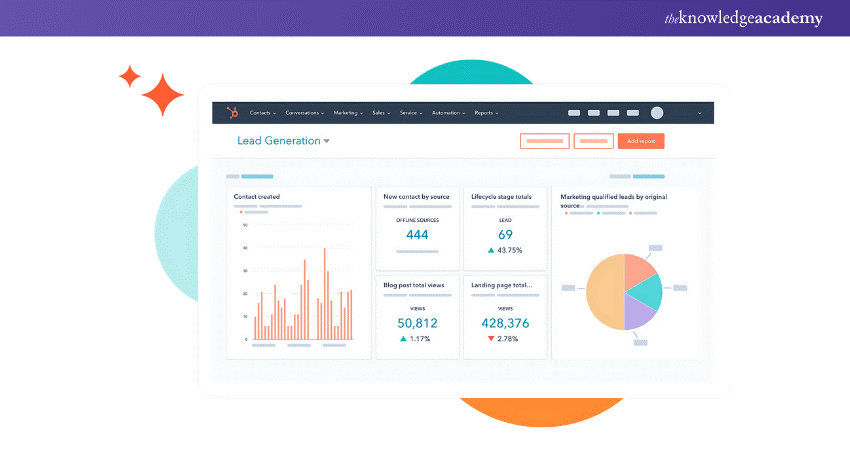
Pros:
a) Intuitive Interface: Easy to manage support tickets and services.
b) Self-Service Portal: Allows users to find answers and submit requests.
c) CRM Integration: Enhances support through seamless CRM functionality.
Cons:
a) Basic ITSM Features: Focuses more on CRM rather than full ITSM capabilities.
b) Cost: Pricing can increase with additional features and integrations.
Transform your sales strategy with our HubSpot CRM Training – join today!
19) SymphonyAI
SymphonyAI offers an ITSM solution with a focus on AI-driven automation and analytics. It includes several features such as incident management, problem management, and Change Management. Key features include AI-driven insights and automation that enhance service delivery, advanced analytics capabilities for performance monitoring, and integration with various IT and business systems.
Pros:
a) AI-driven Automation: Enhances service delivery with advanced AI capabilities.
b) Advanced Analytics: Provides insights into service performance.
c) Comprehensive Knowledge Base: Supports efficient problem resolution.
Cons:
a) High Cost: Can be expensive for smaller organisations.
b) Complex Setup: Initial configuration and customisation can be intricate.
20) HaloITSM
HaloITSM provides a comprehensive ITSM solution with features like incident management, problem management, and Change Management. Key features include a friendly interface that simplifies service management, customisation options that tailor the tool to specific needs, and integration capabilities with various IT and business systems.
HaloITSM’s flexibility and comprehensive feature set make it a popular choice for organisations looking to enhance their IT Service Management operations.
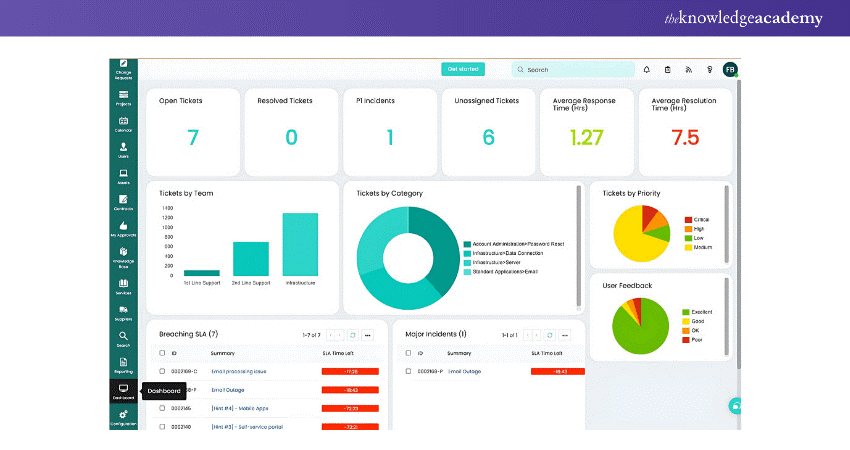
Pros:
a) User-friendly Interface: Simplifies service management with an intuitive design.
b) Customisation Options: Allows for tailored solutions to specific needs.
c) Integration Capabilities: Connects with various IT and business systems.
Cons:
a) Limited Advanced Features: May lack some high-end functionalities.
b) Cost: Higher pricing may not be suitable for smaller organisations.
Learn to align ITIL practices with industry standards for optimal performance with our ITIL® 4 Specialist: Plan, Implement And Control Training. Join now!
Conclusion
Choosing the right ITSM Tool is crucial for enhancing IT Service Management and achieving operational efficiency. Each of the top 20 ITSM Tools highlighted in this blog offers distinct features and capabilities to meet the diverse needs of organisations. By understanding the essential features and evaluating the best options available, businesses can select the ITSM Tool that best aligns with their requirements and goals.
Understand the various ITIL Guiding Principles with our ITIL® 4 Leader: Digital And IT Strategy Certification. Join Now!
Frequently Asked Questions
How do I Choose the Best ITSM Tool?

To choose the best ITSM Tool, evaluate your organisation's needs, consider scalability, integration capabilities, user-friendliness, and cost. Assess how well the tool aligns with your IT Service Management goals and supports your operational requirements.
. Which Three Features are Considered When Choosing an ITSM Tool?

When choosing an ITSM Tool, consider automation capabilities for efficiency, integration options for seamless operations, and reporting features for insightful analytics. These features ensure effective management, streamlined workflows, and valuable performance insights.
What are the key Concepts of ITSM?

Key ITSM concepts include incident management for resolving disruptions, problem management to address root causes, and Change Management to control IT changes. These concepts ensure IT services are delivered efficiently, effectively, and with minimal disruption.
What are the Other Resources and Offers Provided by The Knowledge Academy?

The Knowledge Academy takes global learning to new heights, offering over 30,000 online courses across 490+ locations in 220 countries. This expansive reach ensures accessibility and convenience for learners worldwide.
Alongside our diverse Online Course Catalogue, encompassing 19 major categories, we go the extra mile by providing a plethora of free educational Online Resources like News updates, Blogs, videos, webinars, and interview questions. Tailoring learning experiences further, professionals can maximise value with customisable Course Bundles of TKA.
What is The Knowledge Pass, and How Does it Work?

The Knowledge Academy’s Knowledge Pass, a prepaid voucher, adds another layer of flexibility, allowing course bookings over a 12-month period. Join us on a journey where education knows no bounds.
What are the Related Courses and Blogs Provided by The Knowledge Academy?

The Knowledge Academy offers various Agile IT Service Management Training, including the Certified Agile IT Service Manager (CAITSM) Course. These courses cater to different skill levels and provide comprehensive insights into Service Desk Analyst Salary.
Our IT Service Management Blogs cover a range of topics related to IT Service Management Training, offering valuable resources, best practices, and industry insights. Whether you are a beginner or looking to advance your IT Service Management Skills, The Knowledge Academy's diverse courses and informative blogs have got you covered.
Upcoming IT Service Management Resources Batches & Dates
Date
 Certified Agile IT Service Manager (CAITSM)
Certified Agile IT Service Manager (CAITSM)
Thu 1st May 2025
Thu 31st Jul 2025
Thu 27th Nov 2025






 Top Rated Course
Top Rated Course



 If you wish to make any changes to your course, please
If you wish to make any changes to your course, please


